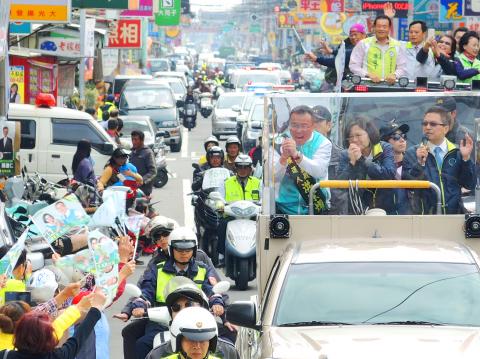Democratic Progressive Party (DPP) presidential candidate Tsai Ing-wen (蔡英文) yesterday canvassed the streets of Nantou, Changhua and Taichung to solicit support in difficult constituencies, calling on voters to concentrate all their votes for the party and its candidates.
On the first leg of her campaign tour yesterday in Nantou’s Jhong Sing New Village (中興新村) to stump for DPP legislative candidates Tsai Huang-liang (蔡煌瑯) and Chang Kuo-hsin (張國鑫), Tsai Ing-wen was greeted by a crowd of overseas Taiwanese and business leaders, who held placards showing where they came from and expressed support for Tsai Ing-wen and the DPP’s candidates.
“Nantou is Taiwan’s heartland, and the local constituencies are a decisive battlefield and a key election indicator. It bodes well for the election if Nantou shows good results,” Tsai Ing-wen said.

Photo: CNA
Dubbing a contingent of overseas supporters the “the Ing overseas clique,” she urged overseas Taiwanese to return to vote in the presidential and legislative elections on Saturday to be part of the nation’s progress.
Describing the DPP as “the No. 1 brand of reform,” she called on voters to cast their legislator-at-large votes for the party, saying the DPP’s lineup of candidates is a good representation of a progressive force that deserves a mandate.
She also asked DPP supporters not to split their votes with other parties, but instead concentrate their votes for the DPP and its candidates to achieve a DPP majority in the legislature.
In response to reporters’ questions about what difference it would make to Taiwan’s male-dominated political sphere if she is elected president, Tsai Ing-wen said, in English: “At least we get to prove this a place where we address and then achieve gender equality.”
On her relations with China and dealing with Chinese President Xi Jinping (習近平), she said: “It is a matter of communication, communication and communication.”
Her motorcade procession later toured the streets of downtown Nantou and Changhua’s Shim (溪湖) and Yanpu (鹽埔) townships, which were lined with supporters waving flags and setting off firecrackers.
The procession was later greeted by a colder crowd at the embattled Shalu District (沙鹿) in Taichung, where DPP legislative candidate Chen Shih-kai (陳世凱) is pitted against KMT Legislator Yen Kuan-hen (顏寬恆), who is seeking re-election, so the motorcade made a detour to the district to improve Chen’s chance of election en route to Changhau’s Yuanlin Township (員林), where a nighttime rally was held.
Thousands of DPP supporters braved the rain to attend the rally, the focus of which was seeking a sweeping majority to ensure the first power transition in the legislature and electing the first female president.
Tainan Mayor William Lai (賴清德) encouraged voters to cast their votes regardless of the weather to ensure that Tsai Ing-wen becomes the president elected with the highest number of votes in Taiwan’s history.
Saying she had some of her happiest moments when she saw the DPP overturn the KMT administration in Changhua in the nine-in-one elections in 2014, Tsai Ing-wen said the last mile to bring about the complete transition of power is a few days away, while reiterating that voters should concentrate their votes on the DPP.
She promised a DPP administration would treat cities and counties ruled by the KMT and by the DPP equally, including New Taipei City, where KMT presidential candidate Eric Chu (朱立倫) serves as mayor.

The manufacture of the remaining 28 M1A2T Abrams tanks Taiwan purchased from the US has recently been completed, and they are expected to be delivered within the next one to two months, a source said yesterday. The Ministry of National Defense is arranging cargo ships to transport the tanks to Taiwan as soon as possible, said the source, who is familiar with the matter. The estimated arrival time ranges from late this month to early next month, the source said. The 28 Abrams tanks make up the third and final batch of a total of 108 tanks, valued at about NT$40.5 billion

A group from the Taiwanese Designers in Australia association yesterday represented Taiwan at the Midsumma Pride March in Melbourne. The march, held in the St. Kilda suburb, is the city’s largest LGBTQIA+ parade and the flagship event of the annual Midsumma Festival. It attracted more than 45,000 spectators who supported the 400 groups and 10,000 marchers that participated this year, the association said. Taiwanese Designers said they organized a team to march for Taiwan this year, joining politicians, government agencies, professionals and community organizations in showing support for LGBTQIA+ people and diverse communities. As the first country in Asia to legalize same-sex

MOTIVES QUESTIONED The PLA considers Xi’s policies toward Taiwan to be driven by personal considerations rather than military assessment, the Epoch Times reports Chinese President Xi Jinping’s (習近平) latest purge of the Chinese People’s Liberation Army (PLA) leadership might have been prompted by the military’s opposition to plans of invading Taiwan, the Epoch Times said. The Chinese military opposes waging war against Taiwan by a large consensus, putting it at odds with Xi’s vision, the Falun Gong-affiliated daily said in a report on Thursday, citing anonymous sources with insight into the PLA’s inner workings. The opposition is not the opinion of a few generals, but a widely shared view among the PLA cadre, the Epoch Times cited them as saying. “Chinese forces know full well that

Travel agencies in Taiwan are working to secure alternative flights for travelers bound for New Zealand for the Lunar New Year holiday, as Air New Zealand workers are set to strike next week. The airline said that it has confirmed that the planned industrial action by its international wide-body cabin crew would go ahead on Thursday and Friday next week. While the Auckland-based carrier pledged to take reasonable measures to mitigate the impact of the workers’ strike, an Air New Zealand flight arriving at Taipei from Auckland on Thursday and another flight departing from Taipei for Auckland on Saturday would have to